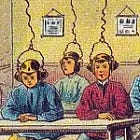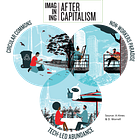Recently I was able to interview Andy Hines again to dive deeper on some of the topics in and around his new book Imagining After Capitalism. Feel free to jump back to these prior articles for context, check out our discussion, and stick around to the end for a chance to win a copy of Andy’s book for yourself!
Positive and Rigorous
We talk about the need for positive images of the future, the need for more methodology in public-facing futures work1, and a few futures that fall outside the guiding images.
Politics and Change
We talk about the major political realignments in the United States of the last decade, how those affect or challenge the long-term trends, and what that means for change in social systems, whether it makes sense to think differently about the political Left and Right, and the overlap between tradwives and communes.
The Role of Shifting Values
Andy talks about the allure (and danger of burning down the current system in order to build something transformative, long-term trends in values and short-term interruptions, the cognitive dissonance we feel from acting against our values, and whether a tolerant Postmodernism can emerge on its own or needs more people with Integral values to keep it in line2. He also helps me understand how Integral values are different from prior orientations, being based more on vision than procedures and prescriptions.
The Broader Conversation
Andy notes the re-emergence of big visions in public discourse, pushback against his book from purists, and finding the little projects and pilots starting to build the systems of the future(s).
Integrating into Futures Work
Andy and I talk about the ecosystem of futurists (ideologically committed vs neutral, academic vs immersed in the details of actual industries and clients, etc), helping clients see past the current turmoil to larger possibilities, and how we can start laying the foundations today.
Writing as Part of a Career
Andy gives advice about how to write a book alongside other projects, making different kinds of work fit together, and how futurists need to get clear about what value they are bringing to the work of helping to build pathways to the future.
Book Giveaway!
Andy was kind enough to offer a two copies of his new book to readers of this newsletter! To indicate your interest, leave a comment engaging with the topics we discuss in this interview; this includes thoughtful responses that continue conversations in the comment section. This is my first time, so I’ll start with some loose rules that make sense to me.
If you already have the book and just want to leave an awesome comment without putting yourself in the running, make it known.
I’m limiting this to US readers only to keep the shipping reasonable.
My intent is to select randomly from relevant commenters, but it’s possible a comment will be so profound that I won’t be able to resist rewarding it.
I’ll announce the winners in two weeks, so get your comment in by August 20th.
This combination of positive images and methodological rigor makes me think of the “earned optimism” animating Karl Schroeder’s Unapocalyptic newsletter.
FYI the Louis Menand book I was grasping for was The Metaphysical Club.




Hello Trisian,
My name is Aaron Barajas, and I'm a first-semester student in the MS in Foresight program at UH, based here in Houston. I came across your blog after watching the presentations from the spring gathering.
I really enjoyed your post on "Writing As A Foresight Thinking Tool" and wish I hadn't missed your presentation. I also appreciated how you and Andy incorporated politics into the conversation, as that's a field where I'm particularly interested in seeing foresight applied. I found myself on the same wavelength as Andy regarding his thoughts on the "far right" mindset and how it represents an old order trying to maintain power.
This got me thinking: with the current leader of the far right, our president, being so central to the movement, what happens when he is no longer with us? Will his message fade away with him? Will a new leader simply take up the mantle? Or, will his party be forced to adopt a foresight-thinking mindset and find a more adaptable approach to the problems they aim to solve?
In your opinion, is the current political climate ultimately beneficial for their party and ideology, forcing them into a more modern way of thinking? Furthermore, can an ideology, idea, or philosophy truly survive without a charismatic leader to champion it?
I'd be grateful for your thoughts.